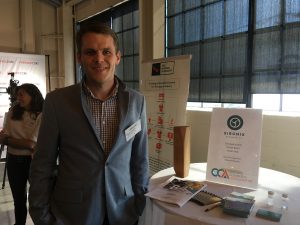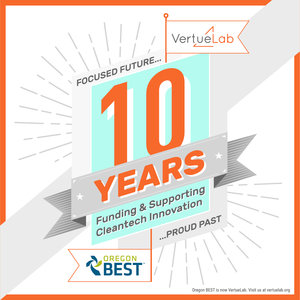Cleantech Ideas And Optimism Abound
Congratulations to the good folks at Vertue Lab for hosting a first-class gathering of the cleantech community in the Pacific Northwest. By spreading the scope of the event to include startups from Oregon, Washington and British Columbia, it offered a unique opportunity to see how each state/province is promoting cleantech in addition to what problems all three have in common.
Here are some takeaways worth sharing:
1. Oregon Punches Above Its Weight With Good People
Oregon’s cleantech composition is (pardon the pun) clouded by the solar industry’s dominance in terms of new jobs created, but it’s not for lack of savvy and dedicated people and institutions fighting for the Lilliputians. In addition to the deep bench at Vertue Lab from David Kenney, Jo Brickman and the rest of the staff to Prosper Portland’s Pamela Neal to the research office at Oregon State University, the state has a fertile landscape to incubate ideas and nurture them through their nascent stages.
2. Early Stage Capital Is Out There
In the words of Katherine Fox of Arnerich Massena to the attendees yesterday, “Get your stories out there!” Impact investing is alive and well in the Pacific Northwest, whether it’s through venture capital, philanthropy or angel funding, there is a large cohort of people in the Pacific Northwest who want their money to support their values–as long as the business plan makes sense.
3. Keep Portland Weird
Every city thinks it’s unique, but Portland has it patented. That’s what will eventually drive industry in Oregon. Example? Only in the Willamette Valley would an entrepreneur bring to market an artisanal vodka made from excess whey from dairy farms. But if you think about it, an outsized number of successful cleantech businesses have been built upon the bricks of what’s previously existed. In Oregon, those precursors include a large distillery in Portland, a thriving dairy industry within a 100-mile radius, and a state in the forefront of the craft beer craze. Wheyward Spirit built upon those foundations to create a “farm to flask” story. If there’s anywhere in America that could create viable and sustainable industries out of “out there” niches, it’s Oregon.
4. Washington and British Columbia Are Also Building Upon Their Success Stories
With thousands of Microsoft millionaires, America’s largest builder of commercial airplanes and the headquarters of the fifth largest airline in the U.S., is it any wonder Washington is a leader in efficiency software platforms and aviation biofuels? Likewise in B.C., its economic history is dominated by natural resource industries like timber and hydroelectricity. “Voila!” what growth companies showed up at Vertue Lab? Those who specialized in Wastewater treatment and biomass-based clean energy. These companies are making the proverbial lemonade out of lemons.
5. A Good Idea Isn’t Enough
Two things separated the interesting startups from those who will get interested investors: revenue and rationale. In the case of the former, if your company has customers and has generated revenue, don’t wait until the 12th slide to tell me. That happened with two different companies whose CEO’s didn’t think it was a top-tier issue for their presentation. As for the rationale, if you can’t explain the problem you’re solving in a sentence, it’s going to be harder to generate investment and harder bring the idea to commercialization.
Over dinner last night with one of the attending companies, I used the example of the EV industry taking off in China, not because the Chinese people have a fondness for lithium-ion batteries, but because the Chinese government fear of social instability and unrest drives many of their policies. In this case, the concern is of a fed-up public who will no longer tolerate breathing in fetid air. In a nation that sells 24 million internal combustion engine cars annually, that’s a head-on collision course, hence why China instituted a mandatory 10 percent non-emissions vehicle target for 2019, which will continue to rise in subsequent years.
6. Cleantech Is Diverse
 In the not-too-distant past, every cleantech conference was populated mainly by white men over the age of 50, but if Vertue Lab’s Showcase was any indication, cleantech is starting to look more like society. Half of the companies in the showcase were either led by or presented by a woman, and of the four distinguished speakers in the roundtable discussion, only one was a white male, and he is nowhere close to 50.
In the not-too-distant past, every cleantech conference was populated mainly by white men over the age of 50, but if Vertue Lab’s Showcase was any indication, cleantech is starting to look more like society. Half of the companies in the showcase were either led by or presented by a woman, and of the four distinguished speakers in the roundtable discussion, only one was a white male, and he is nowhere close to 50.
7. Never Underestimate Novelty
I’ve seen Virginia Emory pitch her startup, Beta Hatch, in numerous settings, and every time, she and her company are one of the names on everyone’s lips. Why? Because she is growing mealworms and insects as protein for animal feed. While it’s inevitable some members of the audience choose to look away from her presentation slides, no one forgets the value proposition.
On the other hand, companies promoting EV chargers, battery storage technology, SAAS software and toxic-free sunscreens face a steeper climb for the audience to recognize their value because they’ve seen similar ideas before. That’s not to say any of these companies can’t succeed or haven’t built a better mousetrap–they may have–but they need their audience to suspend the saying, “familiarity breeds contempt.”
8. Finally
 Congratulations to Christoff Krumm, CEO of Sironix, for winning the 2018 Cascadia Cleantech Accelerator Award. Christoff was one of eight CEO’s whose pitches were judged by a panel of experts after going through a rigorous immersion program with the Washington Cleantech Alliance. Oregon companies also participated in the contest after going through a similar syllabus as did the startups from British Columbia who were mentored by Foresight, Western Canada’s first cleantech accelerator program.
Congratulations to Christoff Krumm, CEO of Sironix, for winning the 2018 Cascadia Cleantech Accelerator Award. Christoff was one of eight CEO’s whose pitches were judged by a panel of experts after going through a rigorous immersion program with the Washington Cleantech Alliance. Oregon companies also participated in the contest after going through a similar syllabus as did the startups from British Columbia who were mentored by Foresight, Western Canada’s first cleantech accelerator program.
If you are interested in watching the presentations from the Showcase, I live-tweeted them @MMGrossman.

